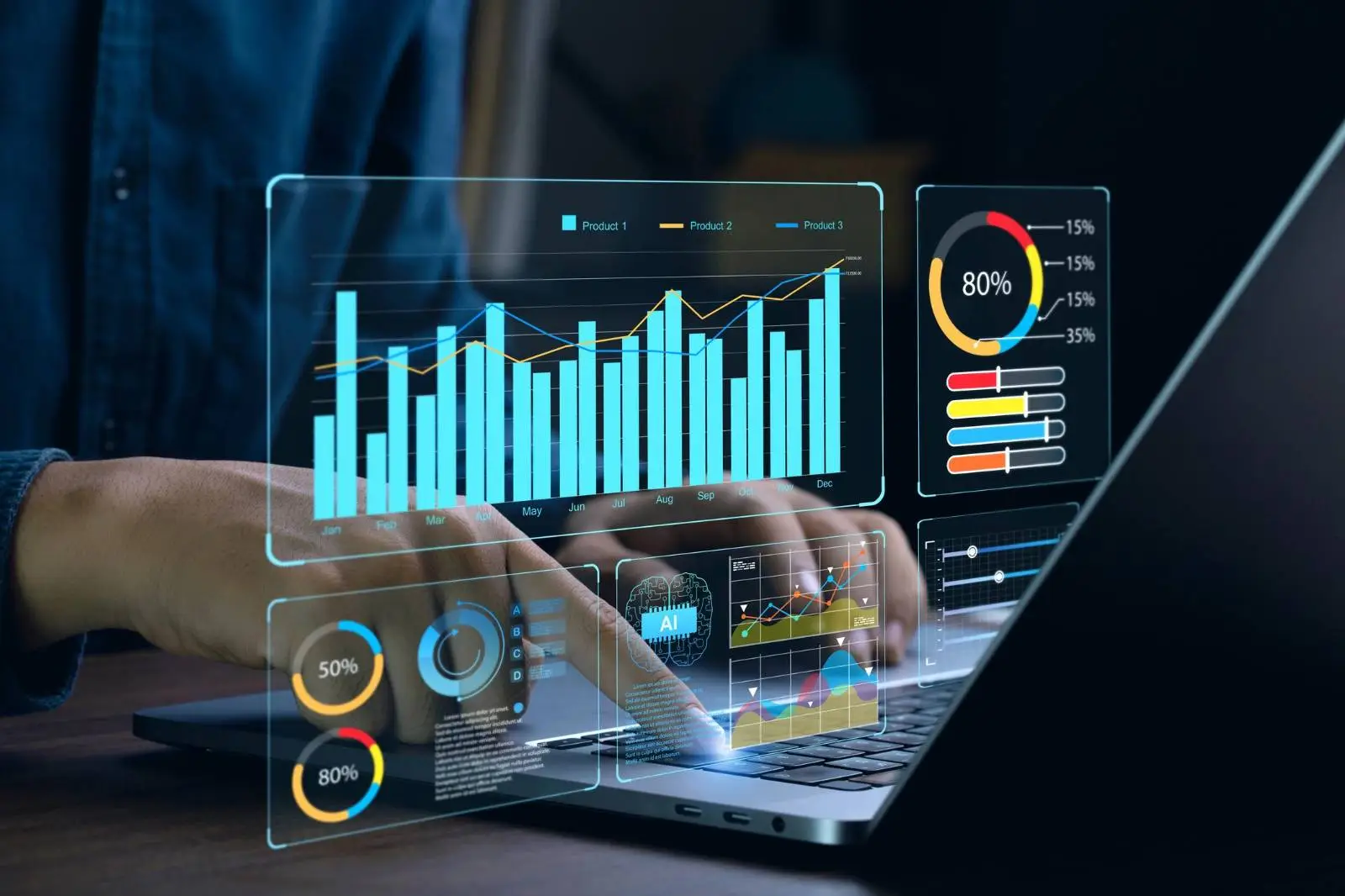Ever since AI became mainstream, nothing has remained the same.
Talk of learning about something new or doing something we’ve been doing for years—this technological marvel has revitalized everything.
Now, of course, this had to impact the internet, too—after all, that’s where everything starts. But the question is, why should it concern a marketer such as yourself? Well, that’s because this “seemingly small” advancement has the potential to revolutionize your entire digital marketing framework. For starters, SEO!
Right from strategies to execution—with the power of artificial intelligence, you can optimize every aspect of SEO in an instant.
Statistically speaking, about 65% of businesses admit to generating better SEO results due to AI. This showcases the transformative potential of AI in SEO.
So, don’t wait! With this blog, explore the ins and outs of AI in SEO and learn to make the most of it. Let’s start!
The Landscape of SEO Before the Advent of AI
AI has primarily affected search engine algorithms. It has enabled them to provide better, more refined results for user queries.
Here’s what it was like before:
Extremely Predictable Algorithms
Back when AI was not integrated with SEO, search engine algorithms used to be highly predictable. This means it was comparatively easier to manipulate them. More often than not, SEO experts indulge in unfair practices to make their content rank at the top of the SERPs. This made it more challenging for search engines to generate relevant results.
Optimization Was Keyword-Centric
Today, “keyword stuffing” is one thing that every SEO expert wants to avoid. But it wasn’t always like that. Earlier, SEO specialists would look for ways to stuff in as many keywords as possible to appear at the top of the SERPs. Unfortunately, the content’s quality wasn’t the primary touchstone for success.
Link Spamming Was Normal
Before AI came into the picture, search engine algorithms relied on links to assess the credibility and relevance of websites. The SEO experts smart enough to observe this pattern would exploit it, often using artificial backlinks and repeating links (also called link spamming) to rank higher. It was only after the release of Google’s Penguin 1.0 that this came to a halt.
Manual Process
SEO also used to be a largely manual process. From keyword research to overall content optimization, experts had to do everything on their own. This made the entire procedure long-drawn, technical, and prone to errors.
The Landscape of SEO After the Advent of AI
Thanks to the integration of AI, SEO has become much more dynamic, efficient, and user-centric.
Here’s how:
More Complex Algorithms
Unlike before, search engine algorithms aren’t easy to manipulate. With the incorporation of technologies like AI and ML, they are more focused on providing results that are the most relevant to a user’s query rather than following a “keyword matching” approach.
Optimization is Semantic
Before AI, the only sure-shot way of appearing at the top of a user’s search results was by using as many relevant keywords in the content as possible.
However, this changed. Today, search engine results are more inclined toward user intent, meaning that your content must be value-rich and relevant in terms of search, location, device, etc., to appear in a user’s feed.
Greater Focus on Quality Links
AI can assess the quality of links added to a piece of content. Unlike before, you cannot just throw in links to build backlinks. This technology can identify unnatural linking patterns and manipulative practices to filter out content with semantic links only.
Smart Automated Process
AI has largely automated the process of SEO. This means you no longer have to dive deep into market research, competitor analysis, and other nitty-gritty to create SEO-optimized content—AI can take care of these for you. However, it’s still vital for any marketer to have a deep understanding of SEO best practices.
How Can Marketers Utilize AI to Improve SEO Efficiency in 2024?
Today, as many as 68% of businesses are using AI to generate better content marketing return on investment (ROI).
You can do that too—here’s how:
- Discover New Ranking Opportunities
As the competition becomes more cutthroat every day, finding new, unexplored ranking opportunities has become necessary. In this regard, AI can come in handy.
Innumerable AI-powered tools can help you discover keywords with less competition, credible links, and other elements that can transform your ranking at the top of the SERPs.
- Create Quality Content
It’s 2024, which means that if your content quality is not up to par, your chances of making it to the SERPs are slim. But AI can help.
With this technology, you can get support in fabricating content that strikes a chord with the user’s search intent. From locating content gaps to finding the ideal content structure, AI tools can uncover crucial insights that reveal how to create the best-quality content that resonates with the user’s intent.
- Better Optimize the Content
Content optimization has surpassed the flimsy standards of adding keywords and links. Today, it’s more about personalization and user intent. AI facilitates these as well.
AI tools can help you create content that is well-optimized for user intent. They can give recommendations on how to create an authoritative, high-quality one. They can also help you meet Google’s E.A.T standards swiftly and efficiently.
- Optimize for Voice Search
As per statistics, voice search is used by more than 50% of adults worldwide. AI can help you leverage this SEO trend.
Several AI tools let marketers develop Video Search Engine Optimization (VSEO) optimized content from scratch. They also help you create more conversational content to ensure it appears in the search results whenever a user makes a voice query.
- Automate Processes
One of the best advantages of AI integration in SEO is the automation of the process. However, it might seem like a minuscule edge, capitalizing on it has its pros.
For instance, these AI-powered tools can help you offload multiple arduous tasks. From keyword research and optimization to fixing content-related issues, they can help you save time and redirect your efforts to other facets of digital marketing.
3 Real-World Implementations of AI in SEO & Digital Marketing
The concept of AI in digital marketing might be new to you. But brands have been leveraging its pros for a while now. Here are three examples:
- LinkedIn’s Collaborative Content Program
LinkedIn launched its collaborative articles program in 2023. At its core, the program basically involved creating AI-generated articles and inviting subject-matter experts to start a conversation around them. And well, it turned out to be a massive success!
The reason? Well, through this AI-powered collaborative approach, LinkedIn was able to satisfy its users’ need for value-rich content. Moreover, since the contribution was entirely based on an “invite-only” basis, only experts with authority on the topic were allowed to participate—a smart move that complied with Google’s E-E-A-T framework.
- Spotify’s Personalized Music Recommendations
Statistically, about 89% of marketers tend to witness a positive ROI when they season their content with personalization features. Spotify is one of them.
This music streaming platform has been using AI to analyze user data and curate personalized playlists for each of its users long before it became mainstream. Probably a goldmine for marketers looking for inspiration on how to use user insights most efficiently!
- Coca-Cola’s Interactive Advertising Campaign
Coca-Cola took AI utilization in marketing to new heights with its “Create Real Magic” campaign.
They created an AI-powered platform that allowed users to witness and participate in the creative process of their advertisements. The platform mainly capitalized on user-generated content to let users create their own ads for the brand.
This way, they garnered a fresh audience while also developing a pool of user-generated content to use in future campaigns.
Wrapping Up
Artificial intelligence has shaped many aspects of digital marketing. However, its impact on SEO has been particularly revolutionary.
Whether prioritizing user intent over gimmicky keyword stuffing or pushing ethical SEO best practices to ensure quality over quantity, AI has opened an arena of opportunities for marketers to redefine their digital presence through SEO.
At Momentum 360, we host SEO campaigns tailored to every business’s unique needs. Whether you require assistance with Google Ads, Facebook Ads, or SEO strategies, our team of digital marketing experts is dedicated to finding the optimal solution for your business’s success.
For more help, reach out to us today!
FAQs
- How is AI used in digital marketing?
AI is widely employed in digital marketing across various functions, significantly enhancing efficiency and effectiveness.
- One prominent application is personalized marketing, where AI algorithms analyze customer data to tailor campaigns, recommendations, and experiences to individual preferences and behaviors.
- Additionally, predictive analytics powered by AI assist marketers in forecasting future trends, customer behaviors, and campaign outcomes, enabling data-driven decision-making and strategy optimization.
- Content creation and optimization also benefit from AI, as tools analyze data trends, user behavior, and search patterns to generate, curate, and optimize content, ensuring relevance and engagement while maximizing visibility on search engines. AI-driven chatbots play a crucial role in customer service by providing instant support, answering queries, and offering recommendations.
Overall, AI empowers marketers to deliver more personalized, data-driven, and impactful marketing initiatives.
- Can AI write SEO content?
Though AI can generate content, there are still issues with its accuracy and uniqueness. Furthermore, AI-generated content may lack the nuanced understanding of language and context that human writers possess, potentially resulting in less engaging or relevant material. Therefore, while AI can assist in content creation, human oversight and editing remain essential to ensuring high-quality SEO content.
- Is AI taking over SEO?
No, AI is not taking over SEO. They are two different things, serving two distinct purposes. However, it can be said that AI is “supplementing” SEO. In other words, it is making it more efficient and organized.
- What are the benefits of AI in SEO?
The most significant advantage of integrating AI in SEO is that it can help you fetch essential customer data, such as their needs, preferences, behavior, etc., to help you develop strategies for increasing website traffic and conversions.
- What are the limitations of AI in SEO?
Despite its advancements, AI in SEO still grapples with various limitations owing to its ongoing development. One significant drawback, particularly in the realm of content creation, is the potential for inaccuracies or reliance on existing content sources. This can undermine the originality and quality of generated content, highlighting the need for human oversight and refinement in SEO strategies leveraging AI.




